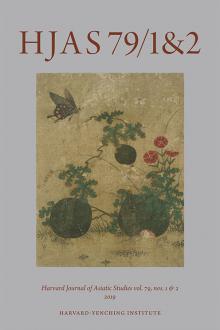June-December 2019
Attributed to Sin Saimdang, Plants and Insects, Chosŏn dynasty. Album leaf, ink and color on silk, H. 27.4 cm × W. 20.9 cm. Harvard Art Museums/Arthur M. Sackler Museum, Louise Haskell Daly Fund and Ernest B. and Helen Pratt Dane Fund for the Acquisition of Oriental Art, 1994.92. Photo: Imaging Department © President and Fellows of Harvard College.
Editorial Preface
Articles
Other Poetry on the An Lushan Rebellion
Notes on Time and Transcendence in Tang Verse
This article examines poetry about the An Lushan rebellion (755–763) written during its course by poets other than Li Bai and Du Fu. Despite the centrality of the rebellion to narratives of Chinese literary history, this corpus of poetry is rarely discussed, in large part because it does not provide the sort of visceral witness to the cataclysm that later readers have expected from verse written in troubled times. Instead, this poetry almost always seeks to transfigure or transcend its historical ground through the invocation of alternate frames by which author and readers come to stand apart from current events. This observation offers us a window onto the relationship between poetic practice during the eighth century and longstanding commentarial ideals about poetry’s relationship to history, as well as a way of recontextualizing Li Bai’s and Du Fu’s innovative poetic responses to the rebellion.
本文討論安史之亂中李白、杜甫以外的詩作。安史之亂於文學史意義重大,但本文所述詩歌因缺乏後世期待的對戰亂切身經歷的描寫,鮮為前人論及。反之,這些詩歌刻意疏離當下,以美化並超越歷史經驗。借此亦可考察八世紀詩歌創作和傳統批評理想間的關係。
Found (and Lost?) in Translation
Culture in The Analects
The use of the word culture to render the Old Chinese term wen 文 in English translations of The Analects increased dramatically from one instance in 1861 to 93 percent in a translation from 2003. This development illustrates how historical changes in word meanings and epistemic assumptions profoundly influence modern Western understanding of early Chinese thought. Semantic changes in the English word culture enabled nineteenth-century translators to discover a concept of high culture—culture as a civilization of assumed universal scope—in The Analects. Subsequently, over the course of the twentieth century, the idea that Old Chinese wen means culture became almost universally accepted. However, since the prevalent concept of culture is now the relative, anthropological concept of culture as a way of life, this assumption is potentially leading to misunderstandings and the propagation of problematic culturalist ideas about culture in early China.
自 17 世紀至 21 世紀,《論語》的英譯本將「文」譯為 culture 的比例陡增。 這說明字義和認識觀念的歷史演變,對現代西方理解早期中國思想的影響甚鉅。 19 世紀的譯者把「文」理解為文明,而 20 世紀則普遍理解為文化。因此 culture 的語義演變会導致西方對早期中國形成的「文」這一概念的誤解。
Absent Presence
Costuming and Identity in the Qing Drama A Ten-Thousand Li Reunion
During the Ming–Qing transition in mid-seventeenth century China, the Manchu government’s hair and dress regulations engendered a sartorial landscape with different dress codes in different social and theatrical spaces. Theatrical costuming, defined as the appropriation of body and clothing, responded continuously to that changing landscape through the nineteenth century. This article explores those responses through the case of the Qing drama A Ten-Thousand Li Reunion. By synthesizing textual fragments, visual representations, performance records, and clothing history, I suggest that theatrical costuming in Qing drama provided a productive way to associate body, clothing, and individual identities that were constantly in tension with historical changes.
明清易代之際,滿族政府的服飾政策導致現實生活和戲曲演出採用了不同 類型的服飾和髮式。這種變化進而影響了戲曲文本和演出中對身體及服飾的描寫 與使用。通過討論清代戲曲《萬里圓 》,本文揭示了有清一代戲曲裝扮與種族認同 之間的複雜關係。
The Sound of Learning the Confucian Classics in Chosŏn Korea
This article explores instantiations of cosmopolitan-vernacular mediation within the sinographic cosmopolis. Placing the publication of the Chosŏn (1392–1910) Vernacularized Classics, published by the Office of Review and Rectification, within the larger context of evolving reading technologies and state Confucianism, this article highlights how the Chosŏn state mobilized orality (utterance) and aurality (hearing) to supply Chosŏn readers with the voice of an imaginary tutor who specializes in vocalization that they could simulate. This standardized vocalization recipe became the representative sound of learning in Chosŏn as the practice of simulating the tutor’s voice became a normalized part of preparing for the civil service examinations. This article shows how the creation of The Vernacularized Classics generated a new erudite linguistic register that shaped the soundscape of Chosŏn society.
본 논문은 사서삼경의 조선판인 경서 언해본의 간행 유포와 페이지 구성을 살피어 경서 언해본이 규범적 음독 독서법을 매개로 한문에 담긴 유교 경전을 자국어화하는 도구로 제작되었고 공동문어를 자국어화 시키는 독서법은 과거제도를 통해 학습과 학문의 독서성으로 자리잡았다고 주장한다.
Informing the Public in Song China
Over time, the Song government increasingly communicated with ordinary people through writing, a practice made easier by the growing availability of printing technology. The central government regularly instructed local officials to post notices, and local officials used notices for both routine situations and urgent needs. In addition to surveying the central government’s instructions to local governments to post notices, I examine in more detail the use of notices as a weapon against official corruption during Gaozong’s reign, Zhu Xi’s well-documented use of notices as a local official, and the use of notices to mitigate panic in Kaifeng in 1126–1127 after the Jurchen had gained control of its walls. Looking at government communication via notices suggests that Song officials not only frequently relied on market forces to achieve compliance from ordinary people but also expected that most ordinary people had access to literate elders in their local communities
本文根据官史、文集和筆記中的記載,論述宋代印刷技術的普及對中央及地方政府與平民交流方式的影響。對各方告示的功用的分析,有助於我們進一步了解宋代百姓在國家、社會和地方文化中的地位。告示使得宋朝官員不僅能依靠市場使百姓服從政府,而且期望多數人能接觸到當地的識字長者。
